
Virginia political pundits unearth trends in Trump’s victory
Virginia political pundits unearth trends in Trump’s victory
Virginia Business// December 30, 2016//
How did Donald Trump win the White House?
On the day after the election, five Virginia political observers offered their perspectives on the Republican billionaire’s stunning victory. Most polls leading up to the election had predicted former Secretary of State Hillary Clinton would win.
“The mechanics of polling are really changing rapidly” because of the widespread use of cell phones, said panelist Stephen Farnsworth, a professor of political science and director of the Center for Leadership and Media Studies at the University of Mary Washington. The university’s poll showed a much closer race in Virginia than many other surveys did.
In assessing Trump’s victory, another panelist, Whitt Clement, cited the candidate’s skillful use of trade issues. Clement, head of the state government relations practice group at Hunton & Williams LLP in Richmond, said the big jump in Obamacare premiums announced late in the campaign also had an effect on the outcome. “My gosh, what better issue do you need to seal the deal for Donald Trump,” he said.
Panelists also believe that the FBI investigation of Clinton’s use of a private email server and the release of Democratic Party emails through WikiLeaks also had an influence on the election. “There was just a constant flow of this information that overall had a huge impact,” said Ben Dendy, president of the Richmond-based government relations firm Vectre Corp.
The panelists also looked at effects the national election could have on U.S. Sen. Tim Kaine of Virginia, who was Clinton’s running mate, and the 2017 gubernatorial election.
“Kaine, having been elected to the Senate under ideal conditions, in a presidential year in which he ran ahead of Barack Obama in Virginia, is now looking at the most perilous conditions under which he’ll have to defend that Senate seat,” said Jeff Schapiro, the Richmond Times-Dispatch’s political columnist.
The panel’s outlook for the upcoming General Assembly session was succinct. In a legislative election year, lawmakers’ priority will be “passing the budget and going home. That’s it,” said Chris Saxman, the executive director of Virginia FREE (Virginia Foundation for Research and Economic Education). “They’re going to be in and out.”
The Virginia Business moderators were Managing Editor Paula Squires and Senior Editor Jessica Sabbath. The discussion took place at a luncheon attended by about 60 people at the Omni Richmond Hotel. The following is an edited transcript.
Virginia Business: The pundits got it wrong. The press got it wrong. Most of the polls got it wrong. The campaigns even got it wrong. Why was everyone so wrong?
Saxman: I think one of the problems that we saw in the polling this year was relative to how you model this kind of an election. This is a very different modeling than the ’08 and ’12 cycles were. I think that it was very difficult for pollsters to get a handle on what was really going on out there. What I try to tell audiences and students is: Don’t follow the ball in politics, and polling is following the ball. It doesn’t really tell you what’s actually going on in the game. At the end of the election, when you saw Barack Obama and Hillary Clinton on stage in Philadelphia to close out the campaign, that’s a sign that there’s a problem. Their turnout in Philadelphia was so depressed that they had to have Bruce Springsteen and Bon Jovi have a concert to bring people out in Philadelphia. That means Pennsylvania’s in play.
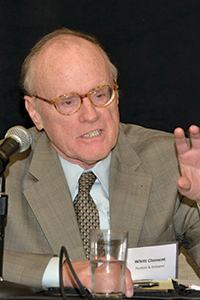 Clement: I remember when Donald Trump started talking about these bad trade deals and [and the effect they have had on blue-collar workers. After seeing what had happened in Southern Virginia], I said to a lot of my friends here in Richmond, “don’t kid yourself about that trade issue.” In the southeastern United States, NAFTA has been bad. People lost their jobs, and they’ve grown too old to adapt to new skills. It’s been horrible for those families, and I think these Rust Belt states in the Midwest had similar effects … I think that was a strong undercurrent that never went away. [On top of that was the announcement of] the increase in the premiums of the Affordable Care Act during the last 10 days of the campaign. My gosh, what better issue do you need to seal the deal for Donald Trump? In hindsight, I think, those were big factors.
Clement: I remember when Donald Trump started talking about these bad trade deals and [and the effect they have had on blue-collar workers. After seeing what had happened in Southern Virginia], I said to a lot of my friends here in Richmond, “don’t kid yourself about that trade issue.” In the southeastern United States, NAFTA has been bad. People lost their jobs, and they’ve grown too old to adapt to new skills. It’s been horrible for those families, and I think these Rust Belt states in the Midwest had similar effects … I think that was a strong undercurrent that never went away. [On top of that was the announcement of] the increase in the premiums of the Affordable Care Act during the last 10 days of the campaign. My gosh, what better issue do you need to seal the deal for Donald Trump? In hindsight, I think, those were big factors.
Dendy: I would just say, on the trade issue, I think it certainly was a vote getter in the Rust Belt and areas like that, but it is really going to be interesting to see if any of those jobs come back. More than because of the trade agreement, those jobs have been lost because of technology. In fact, I was reading some articles saying that, as jobs are created in Mexico, in many cases they’re creating higher-level, technology jobs back in the United States. The reality of the situation is that those jobs probably are not going to come back, and unfortunately, some of the same may be true for the coal industry in Virginia, but it will be interesting to see over the next four years if there’s any change in that.
Schapiro: I’ve always been bewildered by the inability of Hillary Clinton to get any real mileage out of the historic character of her candidacy. To hear younger women, particularly younger professional women, sort of dismiss the efforts of women of Hillary Clinton’s generation, that was something that clearly indicated that was not a vote on which Mrs. Clinton could count. It was clearly a vote that a lot of the prognosticators believed would be decisive to her candidacy … Also, the great gift of [FBI Director] Jim Comey to the Trump campaign, renewed investigation of the Clinton emails, made it much easier for the most partisan voters, if you will, the voters [most hostile to Clinton], to turn out in significant numbers in early balloting states.
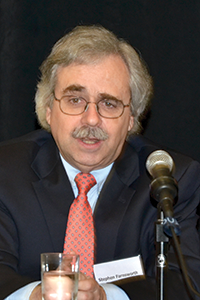 Farnsworth: We do an annual poll at Mary Washington, and we found a three-point gap favoring Clinton over Trump in Virginia, and we got some ribbing from some of the other pollsters because we showed the race to be a lot closer than a lot of other polls did. The nature of polling does, I think, lend itself to approximations at best. The mechanics of polling are really changing rapidly.
Farnsworth: We do an annual poll at Mary Washington, and we found a three-point gap favoring Clinton over Trump in Virginia, and we got some ribbing from some of the other pollsters because we showed the race to be a lot closer than a lot of other polls did. The nature of polling does, I think, lend itself to approximations at best. The mechanics of polling are really changing rapidly.
I just want to say two things about that as part of the reasons why pollsters were so surprised. The first is the question: Who is a likely voter? We have a series of questions that we ask, and we all ask more or less the same questions. How much attention are you paying [to the election]? Did you vote in the last election? Do you know where you would vote this time?
Those sorts of things give us a sense of how likely one is to participate, and I think that Trump kind of breaks the likely voter model that we saw in 2012 because a lot of the Trump supporters are not so much Republicans, not so much disaffected Democrats, as they are disaffected, period. That may be the reason why some of those likely voter models that we use are not bringing into the conversation the people who were likely voters this year but wouldn’t have been likely voters if Trump weren’t on the ballot. I think that’s part of the explanation.
The other thing is the challenge that pollsters have facing modern technology. People are used to picking up their landlines, but if you see an unknown number on your cellphone, you’re not likely to take that call. So, for us to get representative samples, we really struggle. It is a real challenge to find people willing to talk to us. To do this right, we figure we need 60 percent [cell phone respondents], 40 percent landline in terms of our calls. So few people will pick up, we have to keep at it. That’s one of the reasons why I think we are in a kind of transitional period in terms of what we’re doing with polling and what’s working and what’s not.
VB: Can you tell us what you think this win says about the mood of the American electorate? What message does it send?
Saxman: [Except for George H.W. Bush] America has been picking outsiders [for president] since Watergate, and no one picks up on that theme. We want something new. That’s part of our demand in politics. We want change. We’re not satisfied with what we have … There’s also a lot of anger out there. A lot of people have been left behind in this economy, and they’re upset. A lot of people think the deck is stacked against them, and they’re right.
Clement: Clearly, Bernie Sanders had a constituency that was much more intense about the issues he espoused than Hillary Clinton did, and I don’t see how the Democratic Party can now ignore that … What are the Republicans going to do with this outraged constituency of Donald Trump, who obviously spoke for so many people? … I don’t think we’re going to see any wall built. I don’t think we’re going to see a number of the things that were promised [by Trump] and that is going to intensify the anger … I think it will be very interesting to see how both parties, the establishment on the Republican side and the Democrats, figure out what to do in trying to solve that very intense issue.
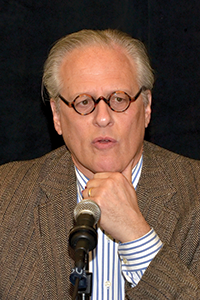 Schapiro: Well, I’m angry. I’m angry because I’m legacy media, and you all don’t pay attention to us anymore, and Donald Trump appreciates this. This is an evolving trend in politics and the media. No longer is it a reporter for the Times-Dispatch, it’s that personality with a particular newspaper. It’s all about the individual brand, and that individual brand was something that Trump had certainly well established as a businessman and as an entertainment figure. I think it also allowed him to very crisply reach into that pool of anger but more importantly for those who were feeling pain to connect with him.
Schapiro: Well, I’m angry. I’m angry because I’m legacy media, and you all don’t pay attention to us anymore, and Donald Trump appreciates this. This is an evolving trend in politics and the media. No longer is it a reporter for the Times-Dispatch, it’s that personality with a particular newspaper. It’s all about the individual brand, and that individual brand was something that Trump had certainly well established as a businessman and as an entertainment figure. I think it also allowed him to very crisply reach into that pool of anger but more importantly for those who were feeling pain to connect with him.
VB: Did the hacked WikiLeaks emails play much of a role in this election?
Saxman: Huge.
VB: And why?
Dendy: It was just constant. It wasn’t just WikiLeaks. It was Comey. It was the emails. There was just a constant flow of this information that overall had a huge impact.
Clement: It was a constant drumbeat. It just never went away. Never got beyond it.
Saxman: There were a couple [of leaked emails] in there that just infuriated, I think, certain segments of the electorate, especially members of the Catholic Church [because of criticism of the church by some campaign officials] … That was catastrophic for [Hillary Clinton] in some of those Rust Belt areas, which are also predominantly Catholic.
Dendy: While that’s true, I don’t think we ought to let it go without saying how horrible it was that [the hacking] was done. I’ve been in politics for 40 years, and I don’t think there’s anybody that I know of, if you took all of their emails, today would be in good shape. That was a huge crime. That was private information.
VB: Now that he’s won, he has to lead. How will Trump deal with the after effects of such a rancorous campaign in which he insulted women, Muslims, a decorated war veteran and, of course, many of the people in his own party? Is it going to be a quick kiss and makeup?
Clement: I’ve got to think we’ll see a different Donald Trump. Surely, he will rise to the occasion.
Schapiro: I don’t think that one can underestimate the aftershocks of this continuing division within the Republican Party. I mean Paul Ryan, the speaker of the House, is the embodiment of the Republican establishment, for lack of a better description. Certainly, he will bring to this process a measure of institutional knowledge, a certain intimacy with governing and governance that will clearly be lacking initially in the Trump White House. This would seem to be an opportunity … for the Trump movement to graft itself to these comparatively speaking “grownups” on Capitol Hill. A lot of what Trump has talked about doing [would be] by executive fiat. This is the same [approach] we complained about with Barack Obama, the sweeping use of executive authority. I think there is an opportunity for the new president to learn about how our system works. Whether there can be a level of trust and some comfort between the Republicans on the hill and the Trumpians at the bottom of Pennsylvania Avenue, that remains to be seen.
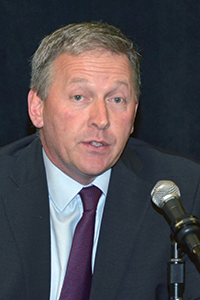 Saxman: I think the challenge for Trump going forward as he pivots toward being president in government is still maintaining a level of his instinctive behavior that got him there. That authenticity still has to resonate in himself and with his supporters. That’s where a lot of politicians get off the rail: They become inauthentic. I think Tim Kaine is one of the most authentic people in politics ever, and it serves him well. Whether Trump can strike that balance is, I think, the real question for him.
Saxman: I think the challenge for Trump going forward as he pivots toward being president in government is still maintaining a level of his instinctive behavior that got him there. That authenticity still has to resonate in himself and with his supporters. That’s where a lot of politicians get off the rail: They become inauthentic. I think Tim Kaine is one of the most authentic people in politics ever, and it serves him well. Whether Trump can strike that balance is, I think, the real question for him.
VB: Well, this is a good segue because we did want to talk about Tim Kaine, and where does Clinton’s defeat leave him? Editor’s note: After this roundtable discussion was held, Kaine said he will not run for president or vice president in 2020.
Schapiro: In deep kimchi. He’s going to have to defend [his Senate seat] in 2018. That’s an off year. I’m sure many of you remember that the supposedly unbeatable Mark Warner came close to being beaten for a second [Senate] term in an off year. So Kaine, having been elected to the Senate under ideal conditions, in a presidential year [2012] in which he ran ahead of Barack Obama in Virginia, is now looking at the most perilous conditions under which he’ll have to defend that Senate seat.
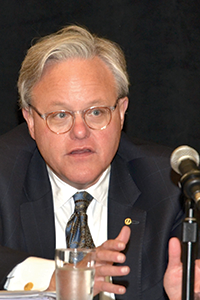 Dendy: I really think he comes out of the race relatively strong. You don’t hear a lot of negative comments about him. I think he ran a strong campaign, and if you look around the country at other candidates who’ve been on national tickets, even George McGovern got re-elected in South Dakota in the next cycle [after being defeated for the presidency in 1972]. I think, in some ways, he probably enhanced his brand. Another thing about the 2018 midterm election … There will be a sitting Republican president. If history is any indication, regardless of the president, in the [following] midterm elections, there’s buyer’s remorse [by voters, resulting in the opposing party gaining seats]. I think there might be a good chance of that in 2018.
Dendy: I really think he comes out of the race relatively strong. You don’t hear a lot of negative comments about him. I think he ran a strong campaign, and if you look around the country at other candidates who’ve been on national tickets, even George McGovern got re-elected in South Dakota in the next cycle [after being defeated for the presidency in 1972]. I think, in some ways, he probably enhanced his brand. Another thing about the 2018 midterm election … There will be a sitting Republican president. If history is any indication, regardless of the president, in the [following] midterm elections, there’s buyer’s remorse [by voters, resulting in the opposing party gaining seats]. I think there might be a good chance of that in 2018.
Saxman: A number of Republicans were already lining up for the possibility that they were going to run for the open seat in ’17 and ’18 if Tim Kaine [and Hillary Clinton] won, and I’ve had conversations with many of these candidates. The quality of that candidate — whether they have the organization, the message, and the money in ’18 — will determine that. I think Kaine is strong going into ’18 because of his name ID. I think he [relates] well to the population in Virginia. I don’t think he plays the prosecutor as well as he does the defense attorney, and that showed up in the debates because it’s not authentically him. Hopefully he’ll correct that course. But he’s got a great team underneath him, and I think he’ll do well in ’18 if he decides to run again.
VB: Do you think this election will have any implications for the 2017 gubernatorial election here in Virginia?
Clement: Virginia has a tradition of going the opposite way after presidential election years. Now, the exception was with Governor McAuliffe’s election in 2013 following Obama’s re-election in 2012. But, if I had to predict, I would say that the very strong Republican showing in December throughout the country will be more beneficial to Ralph Northam and his running mates than it would have been if Hillary Clinton and Tim Kaine had won. A year is a long time, and it’ll be interesting to see how Trump starts his presidency, but I think inevitably it’s got to help the Virginia Democratic ticket.
Dendy: I think a key piece of it is going to be turnout, and I think the difference between whether the Democrats carry Virginia, in almost any election, is whether Northern Virginia and the core cities turn out. That will be the challenge. If the president is unpopular, if there are issues between the president and federal employees, maybe you would have a good turnout in Northern Virginia. If you don’t, downstate, the Republicans outside of the core cities tend to be favored.
Farnsworth: I think it’s important to appreciate the challenge of on-the-job training for a new president when we think about 2017. It seems to me that both Barack Obama, who had been a senator four years, and George W. Bush, who had been a governor for six, would have benefited from additional training before they ended up president. Of course, with Donald Trump, his on-the-job training in government starts the day he becomes president. That high bar requires extraordinary movement very rapidly to be successful, because issues don’t wait.
It seems to me that one of the challenges that any CEO would face … is this question of how to work collaboratively with others. When you think about working with Congress, Congress is not interested — even from a member of one’s own party — in taking instruction, and similarly the NATO allies are not all that interested in taking instruction. Donald Trump seems throughout his career to be focused on giving instruction, and I think that kind of challenge that Trump faces creates an environment that can be used to Democratic advantage.
If you think about the issues that would animate and motivate Northern Virginia voters, a Trump presidency would be pretty high on the list, it seems to me, and so the successful fortune of the Democratic ticket in 2017, I think, depends on how the White House handles things with a new president in that first year, and that’s really going to be so crucial to whether or not the Democrats or the Republicans win in 2017.